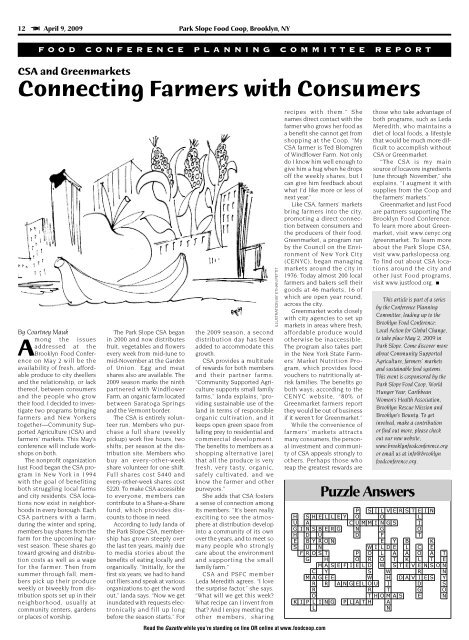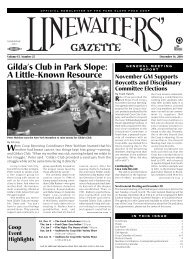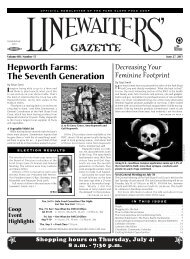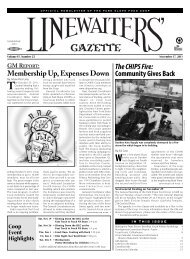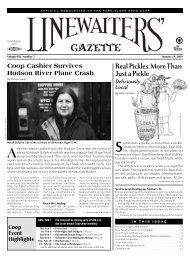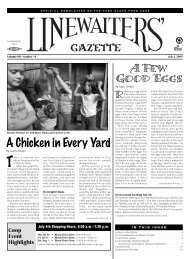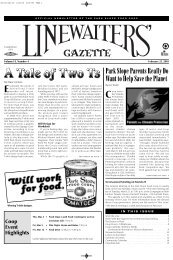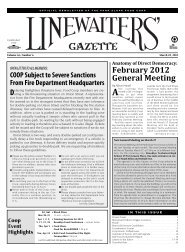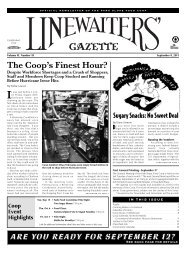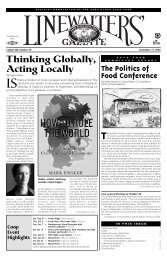Growing Pains - Park Slope Food Coop
Growing Pains - Park Slope Food Coop
Growing Pains - Park Slope Food Coop
Create successful ePaper yourself
Turn your PDF publications into a flip-book with our unique Google optimized e-Paper software.
09-04/09 p1-16.qxd 4/8/09 7:55 PM Page 12<br />
12 April 9, 2009 <strong>Park</strong> <strong>Slope</strong> <strong>Food</strong> <strong>Coop</strong>, Brooklyn, NY<br />
FOOD CONFERENCE PLANNING COMMITTEE REPORT<br />
CSA and Greenmarkets<br />
Connecting Farmers with Consumers<br />
By Courtney Mauk<br />
Among the issues<br />
addressed at the<br />
Brooklyn <strong>Food</strong> Conference<br />
on May 2 will be the<br />
availability of fresh, affordable<br />
produce to city dwellers<br />
and the relationship, or lack<br />
thereof, between consumers<br />
and the people who grow<br />
their food. I decided to investigate<br />
two programs bringing<br />
farmers and New Yorkers<br />
together—Community Supported<br />
Agriculture (CSA) and<br />
farmers’ markets. This May’s<br />
conference will include workshops<br />
on both.<br />
The nonprofit organization<br />
Just <strong>Food</strong> began the CSA program<br />
in New York in 1994<br />
with the goal of benefiting<br />
both struggling local farms<br />
and city residents. CSA locations<br />
now exist in neighborhoods<br />
in every borough. Each<br />
CSA partners with a farm;<br />
during the winter and spring,<br />
members buy shares from the<br />
farm for the upcoming harvest<br />
season. These shares go<br />
toward growing and distribution<br />
costs as well as a wage<br />
for the farmer. Then from<br />
summer through fall, members<br />
pick up their produce<br />
weekly or biweekly from distribution<br />
spots set up in their<br />
neighborhood, usually at<br />
community centers, gardens<br />
or places of worship.<br />
The <strong>Park</strong> <strong>Slope</strong> CSA began<br />
in 2000 and now distributes<br />
fruit, vegetables and flowers<br />
every week from mid-June to<br />
mid-November at the Garden<br />
of Union. Egg and meat<br />
shares also are available. The<br />
2009 season marks the ninth<br />
partnered with Windflower<br />
Farm, an organic farm located<br />
between Saratoga Springs<br />
and the Vermont border.<br />
The CSA is entirely volunteer<br />
run. Members who purchase<br />
a full share (weekly<br />
pickup) work five hours, two<br />
shifts, per season at the distribution<br />
site. Members who<br />
buy an every-other-week<br />
share volunteer for one shift.<br />
Full shares cost $440 and<br />
every-other-week shares cost<br />
$220. To make CSA accessible<br />
to everyone, members can<br />
contribute to a Share-a-Share<br />
fund, which provides discounts<br />
to those in need.<br />
According to Judy Janda of<br />
the <strong>Park</strong> <strong>Slope</strong> CSA, membership<br />
has grown steeply over<br />
the last ten years, mainly due<br />
to media stories about the<br />
benefits of eating locally and<br />
organically. “Initially, for the<br />
first six years, we had to hand<br />
out fliers and speak at various<br />
organizations to get the word<br />
out,” Janda says. “Now we get<br />
inundated with requests electronically<br />
and fill up long<br />
before the season starts.” For<br />
the 2009 season, a second<br />
distribution day has been<br />
added to accommodate this<br />
growth.<br />
CSA provides a multitude<br />
of rewards for both members<br />
and their partner farms.<br />
“Community Supported Agriculture<br />
supports small family<br />
farms,” Janda explains, “providing<br />
sustainable use of the<br />
land in terms of responsible<br />
organic cultivation, and it<br />
keeps open green space from<br />
falling prey to residential and<br />
commercial development.<br />
The benefits to members as a<br />
shopping alternative [are]<br />
that all the produce is very<br />
fresh, very tasty, organic,<br />
safely cultivated, and we<br />
know the farmer and other<br />
purveyors.”<br />
She adds that CSA fosters<br />
a sense of connection among<br />
its members. “It’s been really<br />
exciting to see the atmosphere<br />
at distribution develop<br />
into a community of its own<br />
over the years, and to meet so<br />
many people who strongly<br />
care about the environment<br />
and supporting the small<br />
family farm.”<br />
CSA and PSFC member<br />
Leda Meredith agrees. “I love<br />
the surprise factor,” she says.<br />
“What will we get this week?<br />
What recipe can I invent from<br />
that? And I enjoy meeting the<br />
other members, sharing<br />
ILLUSTRATION BY ETHAN PETTIT<br />
recipes with them.” She<br />
names direct contact with the<br />
farmer who grows her food as<br />
a benefit she cannot get from<br />
shopping at the <strong>Coop</strong>. “My<br />
CSA farmer is Ted Blomgren<br />
of Windflower Farm. Not only<br />
do I know him well enough to<br />
give him a hug when he drops<br />
off the weekly shares, but I<br />
can give him feedback about<br />
what I’d like more or less of<br />
next year.”<br />
Like CSA, farmers’ markets<br />
bring farmers into the city,<br />
promoting a direct connection<br />
between consumers and<br />
the producers of their food.<br />
Greenmarket, a program run<br />
by the Council on the Environment<br />
of New York City<br />
(CENYC), began managing<br />
markets around the city in<br />
1976. Today almost 200 local<br />
farmers and bakers sell their<br />
goods at 46 markets, 16 of<br />
which are open year round,<br />
across the city.<br />
Greenmarket works closely<br />
with city agencies to set up<br />
markets in areas where fresh,<br />
affordable produce would<br />
otherwise be inaccessible.<br />
The program also takes part<br />
in the New York State Farmers’<br />
Market Nutrition Program,<br />
which provides food<br />
vouchers to nutritionally atrisk<br />
families. The benefits go<br />
both ways; according to the<br />
CENYC website, “80% of<br />
Greenmarket farmers report<br />
they would be out of business<br />
if it weren’t for Greenmarket.”<br />
While the convenience of<br />
farmers’ markets attracts<br />
many consumers, the personal<br />
investment and community<br />
of CSA appeals strongly to<br />
others. Perhaps those who<br />
reap the greatest rewards are<br />
those who take advantage of<br />
both programs, such as Leda<br />
Meredith, who maintains a<br />
diet of local foods, a lifestyle<br />
that would be much more difficult<br />
to accomplish without<br />
CSA or Greenmarket.<br />
“The CSA is my main<br />
source of locavore ingredients<br />
June through November,” she<br />
explains. “I augment it with<br />
supplies from the <strong>Coop</strong> and<br />
the farmers’ markets.”<br />
Greenmarket and Just <strong>Food</strong><br />
are partners supporting The<br />
Brooklyn <strong>Food</strong> Conference.<br />
To learn more about Greenmarket,<br />
visit www.cenyc.org<br />
/greenmarket. To learn more<br />
about the <strong>Park</strong> <strong>Slope</strong> CSA,<br />
visit www.parkslopecsa.org.<br />
To find out about CSA locations<br />
around the city and<br />
other Just <strong>Food</strong> programs,<br />
visit www.justfood.org. ■<br />
This article is part of a series<br />
by the Conference Planning<br />
Committee, leading up to the<br />
Brooklyn <strong>Food</strong> Conference:<br />
Local Action for Global Change,<br />
to take place May 2, 2009 in<br />
<strong>Park</strong> <strong>Slope</strong>. Come discover more<br />
about Community Supported<br />
Agriculture, farmers’ markets<br />
and sustainable food systems.<br />
This event is cosponsored by the<br />
<strong>Park</strong> <strong>Slope</strong> <strong>Food</strong> <strong>Coop</strong>, World<br />
Hunger Year, Caribbean<br />
Women’s Health Association,<br />
Brooklyn Rescue Mission and<br />
Brooklyn’s Bounty. To get<br />
involved, make a contribution<br />
or find out more, please check<br />
out our new website,<br />
www.brooklynfoodconference.org<br />
or email us at info@brooklyn<br />
foodconference.org.<br />
Puzzle Answers<br />
P S I L V E R S T E I N<br />
H S H E L L E Y O O L<br />
U A C U M M I N G S I<br />
G I N S B E R G N G O<br />
H D U D F T<br />
E B Y R O N E Y B K<br />
S U N W I L D E L C E<br />
F R O S T P O L A A O A T<br />
G H O R O T K L T E<br />
MASE F I E LD W S T E V E N S O N<br />
C Y S W R N<br />
MAGE E W H D A V I E S Y<br />
R R A N G E L O U I D S<br />
R R T G O<br />
O T H O M A S E N<br />
K I P L I N G P L A T H A<br />
L<br />
N<br />
Read the Gazette while you’re standing on line OR online at www.foodcoop.com


